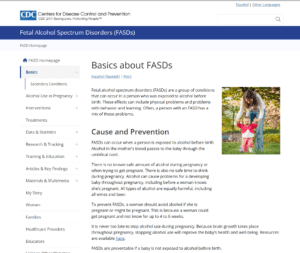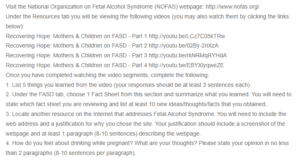Fetal Alcohol Exposure
5 Things Learned from The Video:
- Alcoholism is a common problem that affects those who are pregnant. Prenatal exposure to alcohol through a mother’s consumption affects their children. The quantity and frequency of consumption affect the severity of impacts on the children (FASD United).
- Alcohol interferes with normal brain development, disrupting brain structure and functionality (FASD United). As a toxin introduced into the body, alcohol interferes with brain development by preventing proper wiring and connection of neurons in the brain. Consequently, the expected brain structure is not achieved, and shortcomings in structure formation directly prevent proper functionality.
- Alcohol causes Fetal Alcohol Spectrum Disorders (FASD United). Alcohol affects not only the brain but also other organs in the body. The impacts are illustrated in behavioral, mental, learning, and physical disabilities.
- FASD is evidenced differently among affected children. Children do not have similar symptoms; they are all affected differently due to their vulnerability during their prenatal exposure (FASD United). For some, they may appear normal, but mental disabilities show the effects, while in some cases, they may be tied to other disorders such as ADHD.
- Collaboration with those affected by FASD is detrimental (FASD United). This collaboration is between the affected, their parents, teachers, friends, and other professionals with whom they interact. Interactions may be in recovery programs and other support organizations or facilities. Hire our assignment writing services if your assignment is devastating you.
FASD FAQs Fact Sheet Review
- The impacts of FASD last a lifetime.
- There are several diagnostic criteria, including growth deficiency, facial abnormalities, unusual brain development, and neurobehavioral debilitation.
- There are several categories for diagnosis of FASD; “Fetal alcohol syndrome, partial fetal alcohol syndrome, alcohol-related neurodevelopmental disorders, alcohol-related birth defects, and neurobehavioral disorders associated with prenatal alcohol exposure” (FASD FAQs).
- Each category of FASD has distinctive diagnosis criteria and guidelines.
- FASD is very common, affecting every group of 20 children, at least one child, based on a recent study on first graders.
- Lower IQ is a disability linked to FASD and cognitive and behavioral disabilities, which are very common.
- FASD is a worldwide condition affecting all individuals; therefore, children should be analyzed during adoption for awareness.
- Sleep disorders are common among children with FASD.
- Children can be diagnosed with FASD from as young as nine months.
- Children with FASD are provided with special education in public schools, which utilizes personalized plans to aid learning, and resources such as supplemental security income.
“Fetal Alcohol Spectrum Disorders (FASDs).” Centers for Disease Control and Prevention, Centers for Disease Control and Prevention, 2022, www.cdc.gov/ncbddd/fasd/facts.html.

The resource selected on Fetal Alcohol Syndrome was posted by the Centers for Disease Control and Prevention (CDC). I chose this site because, as a government website, the information shared contains facts, not misinformation. Aside from that, the details on Fetal Alcohol Syndrome are elaborative and clear, making it easy for readers to access and understand the information about the disorder.
The webpage has several descriptive properties. First, the colors used on the webpage promote visibility. Second, the font on the webpage is readable, with distinctions from headings and subheadings to title the content. Third, the webpage uses images to illustrate the content shown in the pictures of the mother and child. Fourth, no ads are plaguing the webpage, as is the case for other websites, focusing on their content. Fifth, their information is supported by references to support the facts shared. Sixth, there are additional links in the content to provide support and more information on the content. Seventh, their webpage provides a list of related articles for their readers who might want more information. Finally, the CDC’s details are provided on the webpage, including their contacts and social media accounts for readers who wish to contact them.
My Thoughts On Drinking While Pregnant
I feel that drinking while pregnant is not a healthy choice for both the mother and the fetus. Alcohol intoxicates adults and has effects on the fetus. I think that the child being formed at that time has the right to develop fully and under healthy conditions. A state of well-being allows one to live a healthy life. Drinking while pregnant may appear to be irresponsible behavior for those aware of their condition. People’s choices have effects on themselves and others. I feel that every child should be given the opportunity to survive by ensuring their health from the time of conception. Subsequently, awareness should be spread to inform all mothers or potential mothers of the harm associated with drinking.
I feel that enlightenment on the impacts of drinking while pregnant is important. Knowing the impacts, people might be more careful and observant. Also, I think that accusations should not be pointed at birth mothers. The mothers and their children have to undergo significant changes. Thus, they should be supported and not traumatized. Societies should be understanding towards those affected and not be discriminative. The daily challenges they face shouldn’t be added but made easier. The lack of knowledge is the main issue with drinking while pregnant.
Works Cited
“FASD FAQs.” FASD United, FASD United, 2022, fasdunited.org/fasd-faqs/.
FASD United (formerly NOFAS). Recovering Hope – Mothers & Children on FASD, FASD United (Formerly NOFAS), 2011, www.youtube.com/watch?v=LCz7C05kTRw.
“Fetal Alcohol Spectrum Disorders (FASDs).” Centers for Disease Control and Prevention, Centers for Disease Control and Prevention, 4 Nov. 2022, www.cdc.gov/ncbddd/fasd/facts.html.
ORDER A PLAGIARISM-FREE PAPER HERE
We’ll write everything from scratch
Question 

Fetal Alcohol Exposure
Visit the National Organization on Fetal Alcohol Syndrome (NOFAS) webpage: http://www.nofas.org/.
Under the Resources tab you will be viewing the following videos (you may also watch them by clicking the links below):
Recovering Hope: Mothers & Children on FASD – Part 1 http://youtu.be/LCz7C05kTRw
Recovering Hope: Mothers & Children on FASD – Part 2 http://youtu.be/02By-2riXzA
Recovering Hope: Mothers & Children on FASD – Part 3 http://youtu.be/rkNRMqRYHdA
Recovering Hope: Mothers & Children on FASD – Part 4 http://youtu.be/EBYXlyqweZE
Once you have completed watching the video segments, complete the following:
1. List 5 things you learned from the video (your responses should be at least 3 sentences each).
2. Under the FASD tab, choose 1 Fact Sheet from this section and summarize what you learned. You will need to state which fact sheet you are reviewing and list at least 10 new ideas/thoughts/facts that you obtained.
3. Locate another resource on the Internet that addresses Fetal Alcohol Syndrome. You will need to include the web address and a justification for why you chose the site. Your justification should include a screenshot of the webpage and at least 1 paragraph (8-10 sentences) describing the webpage.
4. How do you feel about drinking while pregnant? What are your thoughts? Please state your opinion in no less than 2 paragraphs (8-10 sentences per paragraph).